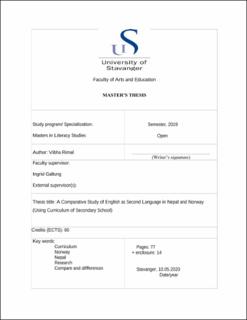| dc.contributor.advisor | Galtung, Ingrid | |
| dc.contributor.author | Rimal, Vibha | |
| dc.coverage.spatial | Nepal | en_US |
| dc.date.accessioned | 2020-08-04T12:13:24Z | |
| dc.date.available | 2020-08-04T12:13:24Z | |
| dc.date.issued | 2020-05 | |
| dc.identifier.uri | https://hdl.handle.net/11250/2670788 | |
| dc.description | Master's thesis in Literacy Studies | en_US |
| dc.description.abstract | This research aims to compares the English subject curriculum for primary and secondary school level in Nepal and Norway focusing on oral competence. Curriculum theory, as well as second language learning theory, support the main idea of the thesis; that curriculum plays a vital role in education, and should be improved before a country improves other matters that affect education.
The study is qualitative in nature, it uses a comparative approach, and relies on the method of content analysis. The data material studied in this thesis consists of the curricula documents of the two countries, with the aim of detecting the best ways to improve the curriculum of Nepal. The comparative analysis focused on all parts of the curricula relating to communicative competence.
The major findings revealed that the Nepalese listening and speaking curriculum of the school level should be emphasizing more on the definition of its main terms, increase student-centered teaching, and focus more on vocabulary enhancement. It should also promote the use role play that relate to authentic contexts for language use. Moreover, it should allocate more time to the teaching of English, and formal assessment should put more emphasis to communicative competence. Lastly, as the world has become globalized and the cross-border migration of people is perpetually increasing, studying an international language in order to acquire the skills of proper communication is very important.
This study reveals possible avenues that could help to develop the oral skills of English language speakers in Nepal. Thus, the findings can be used to formulate recommendations for the enhancement of oral skills in the Nepalese English classroom. Finally, the findings like emphasis on vocabulary and the learner’s own surroundings to speak about, promoting role play is important, pupil should have a better idea of how to introduce, maintain and terminate conversation and time factors are all the findings of the research which can be given a deeper thought by the Nepalese curriculum and start to inculcate and formulate the recommendations for the enhancement of English oral skills. | en_US |
| dc.language.iso | eng | en_US |
| dc.publisher | University of Stavanger, Norway | en_US |
| dc.relation.ispartofseries | Masteroppgave/UIS-HF-IKS/2020; | |
| dc.subject | Curriculum Norway Nepal Research Compare and differences | en_US |
| dc.subject | English Subject | en_US |
| dc.subject | Curriculum Norway Nepal Research Compare and differences English Subject | en_US |
| dc.subject | literacy studies | en_US |
| dc.subject | språkopplæring | en_US |
| dc.subject | engelskopplæring | en_US |
| dc.title | A Comparative Study of English as Second Language in Nepal and Norway (Using Curriculum of Secondary School) | en_US |
| dc.type | Master thesis | en_US |
| dc.subject.nsi | VDP::Humaniora: 000::Språkvitenskapelige fag: 010 | en_US |
